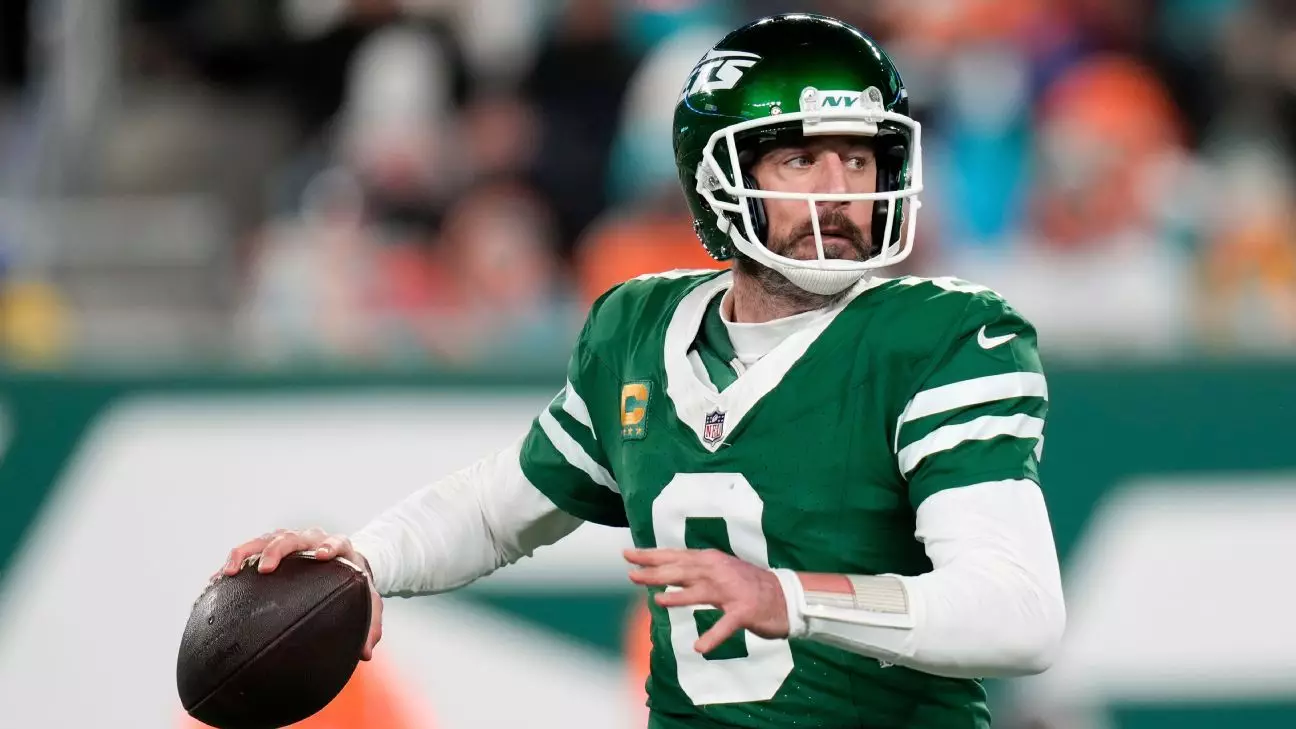For the first time in an illustrious yet controversial career, Aaron Rodgers finds himself navigating the uncertain waters of free agency. Released by the New York Jets, the four-time MVP now faces the daunting task of rebuilding his legacy. The Jets, under new leadership, moved swiftly to sever ties with a player who had come to symbolize both hope and disappointment. As fans, we are left to grapple with the implications of this high-profile split.
Rodgers, 41, stands at a crossroads that many athletes never confront—forcing fans and analysts alike to reassess what his future could hold. The anticipation surrounding his next move feels almost palpable, driven by the energetic thirst for change that has overtaken teams like the New York Giants and Pittsburgh Steelers. The question arises: What does this turbulent development mean for the landscape of professional football?
The Jets’ Calculated Decision
Let’s dissect the Jets’ strategic release of Rodgers. Technically a procedural move, it reflects a deeper reality: the Jets’ eagerness to clear room not just on the roster but also in their psyche. By designating him as a post-June 1 cut, they have demonstrated a keen awareness of their long-term financial health, allowing them to mitigate the immediate impact of his massive $49 million cap hit. But at what moral cost?
Many believed the Jets’ gamble on Rodgers would propel them into Super Bowl contention. However, their reality was marred by a litany of injuries and disheartening outcomes, leading to a disastrous 5-12 finish last season. The juxtaposition between lofty expectations and grim reality illustrates that this was more than a financial decision—it was an emotional one rooted in unfulfilled promises and dashed hopes. The Jets’ new general manager, Darren Mougey, and coach, Aaron Glenn, understood the urgency of fresh beginnings, even if it meant parting ways with a 21st-century football icon.
The Search for a New Home
Where does Rodgers go from here? Teams like the Giants and Steelers are clamoring for a quarterback, and they certainly have enticing offers lined up for him. However, one cannot ignore the sober reality that Rodgers comes with baggage. While his accomplishments are undeniable—he ranks among the elite in touchdowns and yardage—the fallout from his departure raises important questions about age, performance, and resilience.
The Giants are in flux, and the Steelers have unresolved issues of their own. Both teams are quarterback-needy but must weigh the risks of bringing in a player whose recent performance has been as erratic as a coin toss. Rodgers’ success in discussions with these franchises could hinge not just on his skills but also on how well he communicates trust and confidence moving forward.
Legacy in Question
Reflecting on the significance of this juncture in Rodgers’ career pushes us to confront uncomfortable truths. His tenure with the Jets was a cautionary tale where talent, expectations, and reality collided with explosive results. For a player previously revered for his extraordinary abilities, these recent events herald potential shifts outside of just physical form—an alarming reality where his legacy hangs precariously.
The chilling fact remains: last season, he not only finished poorly in statistical rankings but also inadvertently contributed to a culture of losing that’s palpable among fans and players alike. In one-score games, where quarterbacks are often deemed heroes, Rodgers couldn’t muster the magic that once defined him. When your legacy begins to feel like a narrative of failure, it leaves a lingering darkness that few athletes can escape so easily.
A Broader Reflection on the NFL
The unfolding drama surrounding Rodgers offers a microcosm of broader issues at play within the NFL. Teams are forced to make cutthroat decisions driven by both financial acumen and the merciless nature of professional sports. The race for a quarterback mirrors a societal obsession with redemption and the urgency for constant reinvention. Herein lies the lesson: professional sports demand excellence, but players, even legends like Rodgers, are only human and susceptible to the same frailties that plague us all.
As fans, we reconcile our admiration for exceptional talent with the undeniable truth that this talent is intertwined with failure, vulnerability, and the fleeting nature of success. The world will be watching as Rodgers embarks on this new chapter, and we must face our own paradoxical feelings of hope and despair rooted in one man’s journey through the ups and downs of the game he loves.


Leave a Reply